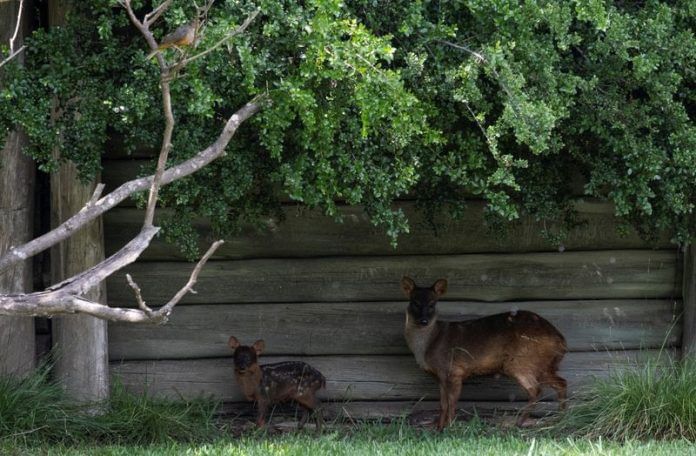By Lucila Sigal
BUENOS AIRES (Reuters) – A rare pudu fawn was born in a biopark in Argentina earlier this month, giving scientists and conservationists a unique chance to study and collect data on the tiny enigmatic deer.
Weighing just 1.21 kg (2.7 lbs), the delicate, fragile and white-spotted male pudu fawn was named Lenga after a tree species endemic to the Andean Patagonian forest of Chile and Argentina.
“It’s a very enigmatic animal, it’s not easy to see,” said Maximiliano Krause, Lenga’s caretaker at the Temaiken Foundation, a nonprofit dedicated to conserving wild species.
Pudus are one of the smallest deer species in the world, growing up to 50-cm (20-inches) tall and weighing up to 12 kg (26.5 lbs).
At just a fraction of that weight, Krause says Lenga is spending his days exploring the park with his mother Chalten and father Nicolino. Lenga is breastfeeding for the first two months until he can handle a herbivorous diet.
After that, Lenga will lose his white spots that help fawns camouflage themselves in their environment. Krause says the mottled color helps the tiny baby deer hide from both daytime and nighttime predators. At about one year, pudus develop antlers and reach up to 10 cm (4 inches).
Pudus are very elusive animals and flee in zig-zags when chased by predators. The tiny deer also face threats from wild dogs and species introduced into southern Argentina and Chile. Only about 10,000 pudus remain and are classified as near-threatened by the International Union for Conservation of Nature (IUCN).
“This pudu birth is obviously a joy for us,” said Cristian Guillet, director of zoological operations at the Temaiken Foundation.
Guillet said that Lenga will help them research and gather data that will help conservation efforts for pudus and other Patagonian deer, like the huemul.
“(This) offers hope of saving them from extinction,” Guillet said.
(Reporting by Lucila Sigal; Writing by Alexander Villegas; Editing by Marguerita Choy)
Disclaimer: This report is auto generated from the Reuters news service. ThePrint holds no responsibilty for its content.





